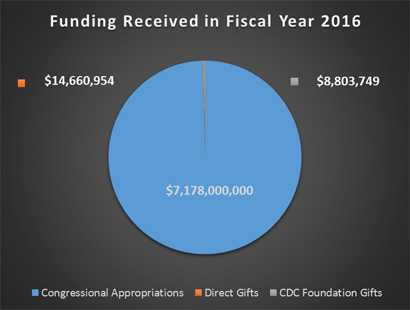Gifts to CDC
Partnerships Help Support a Range of CDC Programs 
For more than a half century, CDC has been a leader in scientific research committed to protect the American people and keep Americans healthy, safe, and secure. Public-private partnerships help federal agencies do more with less, build on the capabilities of others, leverage collective action, improve performance, and realize cost savings. CDC has delegated authority from the Assistant Secretary of Health, HHS, to accept outside gifts. This authority was first given to CDC on March 29, 1983. Specifically, Section 231 of the Public Health Service Act (42 USC 238) authorizes acceptance of unconditional and conditional gifts “…for the benefit of the Public Health Service or for the carrying out of any of its functions.”
Related Resources
Fiscal Year 2016 (FY16)
- Fiscal Year 2016 Gifts to CDC [PDF – 30KB]
- Fiscal Year 2016 Gifts from CDC Foundation to CDC [PDF – 46 KB]
- Fiscal Year 2016 Gifts to CDC Foundation [PDF – 2.1 MB]
Fiscal Year 2015 (FY15)
- Fiscal Year 2015 Gifts to CDC [PDF – 66K]
- Fiscal Year 2015 Gifts from CDC Foundation to CDC [PDF – 59K]
- Fiscal year 2015 Gifts to CDC Foundation [PDF – 2.06 MB]
Questions and Answers about Gifts
How does CDC get operating funds?
The main source of CDC discretionary funds is budget authority which are regular appropriations determined annually by the U.S. Congress. The FY 2016 Omnibus bill appropriated $6.3 billion in budget authority to CDC and directed the Department of Health and Human Services (HHS) Secretary to transfer $892 million in Prevention and Public Health Funds (PPHF) and $15 million in Public Health and Social Services Emergency Fund (PHSSEF) to CDC for a total program level funding of $7.178 billion. Details for FY 2016 are available at: https://www.cdc.gov/budget/
Why does CDC receive gifts through the CDC Foundation when they can receive direct gifts?
The CDC Foundation was created by the U.S. Congress to connect CDC with the private sector—individuals, philanthropies and corporations—to address public health protection challenges. In addition to more flexibility in spending, the CDC Foundation—because it is an independent non-profit—may be able to expedite funding to support public health challenges more quickly than CDC. Expediting funds is beneficial in addressing public health emergencies, such as the 2014-2015 Ebola response and 2015-2016 Zika response.
How does CDC review gifts for potential Conflict of Interest?
CDC’s goal is to have a process that is sound, transparent, and aligns with CDC’s policies. Our responsibility is to be good stewards of the work CDC is entrusted to perform. CDC’s gift acceptance policy requires a review for conflicts of interest (COI) prior to accepting a gift. In May 2014, CDC updated the process to review and document the results of the COI review for gifts received from the CDC Foundation. In April, 2015 that process was expanded to cover all gifts to CDC, not just those donated through the CDC Foundation. Additional information about CDC’s COI process is available at: https://www.cdc.gov/partners/ethical-considerations.html.
- Page last reviewed: December 8, 2016
- Page last updated: April 11, 2017
- Content source:


 ShareCompartir
ShareCompartir